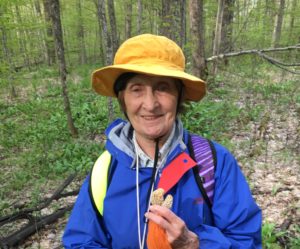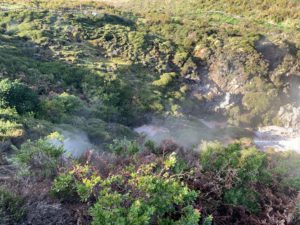Sónia, Praia do Vitória, Terciera Island, Azores
Interview conducted at the crafts fair during the Christmas parade on Rua do Jesus in Praia do Vitória

My mother loves wearing colorful hats. She is famous for them in our Euchre group back home. In my youth we always had a large garden which she tirelessly worked, an annual tradition which she continues today. It has been a year or two since we have morel hunted together. She used to do it with her father and for many years and my brother Marc and I would walk the woods with her for hours. Even when fatigue has set into my younger legs she wanted to keep going. We walked for hours together in the woods. I attribute much of my love of the earth to her teachings.
I am not a big shopper but I do like to make of find handmade gifts for the family this time of year. I stopped into a store claiming to sell Portuguese made good on a walk around Angra do Heroísmo. I saw colorful hats and carefully inspected the label. I have been fooled in the past by vendor selling Chinese made knockoffs, so I carefully inspected the label. The hats appeared to be made in Praia do Vitória where the R Heritage Too is anchored. I set a goal of finding the creator of these colorful creations to buy direct from the person who made them. Rumors of a craft fair set me wandering and in a brightly decorated booth I met Sónia. She radiated happiness as she shared her story, clearly glad to be one of the faces of climate change. Her words follow.
What is your favorite part of living in Praia do Vitória?
I have lived here 18 years and am from the mainland in Algarve. We were coming here on holidays and loved it so much. We are teachers on the island. I teach art and my husband teaches math. We like the weather and the people. They are very friendly. We have good access to the hospital, great internet and an airport.
What is your least favorite part of living in Praia do Vitória?
It can be rainy and grey for long periods of time. But when it gets grey I have my colors. One positive aspect of the rains is that after the rains come, the land looks so clean.
Do you see the changes in the natural world where you live?
Yes. The distinct seasons we used to experience are gone. This year we had a lot more hurricanes. When the rain come, it seems to be for longer times and it gets cold.
We also see changes to the trees on the island. Here the chestnut trees have a new type of disease. The nuts are not longer good for eating. On the mainland in Portugal the cork trees are dying due to the changes to the weather.
How do you think these changes will impact the Azores?
It will become more difficult for people to live. Houses are not prepared for the weather changes that are occurring. One the mainland entire families relied on the cork trees for their livelihoods. These people may have to find new jobs and the land which used to be cork forests may end up as housing.
Can you give me an example of something you are doing to reduce your impact on the planet? We sort of garbage and recycle. We also have solar hot water on our house. Sometimes in the summer it gets too hot and we have to divert it from the panels. In the winter sometimes the water is not hot enough so we have to supplement with electric heat. We want to expand the solar hot water system but teacher salaries have been frozen for some time. We have decided that we can not afford to.
Is there anything you would like to ask or tell me?
We would really like to obtain our electricity from solar but the regulatory structure here makes it cost prohibitive. If you pay all the money to buy and install a solar electric system you are required to put the energy you make into the grid. You can not transfer the energy you make directly to you house. You must then sell the energy you make at a low rate and buy energy from the power company at a higher rate. Fortunately solar hot water is not regulated.
As the sun goes down I am watching wind turbines on top of a hill spin. They have rarely stood still since I have been here. Not far away is a large solar array. Near the Furnas do Enxofre steam

which smells of sulfur rises from volcanic vents. Over the ridge you can hear a geothermal powered turbine which continuously provides almost 5% of the island power needs. Many Azoreans have touted their desire for the islands to be an model for sustainable growth. Based on these observation, I was stunned to learn that people who are willing to invest in solar are discouraged to to do so by the islands energy policies. It seem to be evidence of the influence of petrochemical companies on the island policies described by Ricardo in a previous interview. It certainly seems likely to decrease the demand side of the competitive market equation.
-Matt Ryle